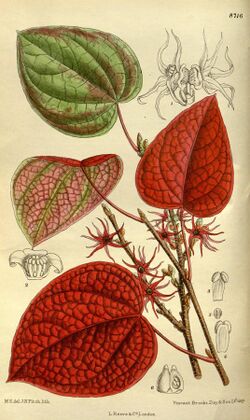Biology:Disanthus
| Disanthus | |
|---|---|

| |
| Disanthus cercidifolia (sic), Curtis's Botanical Magazine, 1917 | |
| Scientific classification | |
| Kingdom: | Plantae |
| Clade: | Tracheophytes |
| Clade: | Angiosperms |
| Clade: | Eudicots |
| Order: | Saxifragales |
| Family: | Hamamelidaceae |
| Subfamily: | Disanthoideae Harms |
| Genus: | Disanthus Maxim. |
| Species | |
| |
Disanthus is a genus containing two species of flowering plants in the family Hamamelidaceae. The type species, Disanthus cercidifolius, was the only known species until 2017, when a second species, Disanthus ovatifolius was described.[1]
Disanthus cercidifolius is native to woodland habitats in China and Japan [2] while D. ovatifolius is found in northern Vietnam[1]
Nomenclature
The type species epithet was originally spelled D. cercidifolia.[3] The International Code of Nomenclature for algae, fungi, and plants stipulates that the Latin grammatical gender is masculine, and so the spelling is D. cercidifolius.[4] Disanthus ovatifolius was first introduced to horticulture in Europe under the invalid name Uocodendron whartonii, honoring the late Peter Wharton, formerly curator of the David C. Lam Asian Garden at UBC Botanical Garden in Vancouver . After scientific study, the new species was assigned to Disanthus.[1]
References
- ↑ 1.0 1.1 1.2 Averyanov, Leonid V.; Endress, Peter K.; Quang, Bui Hong; Nguyen, Khang Sinh; Nguyen, Dzu Van (2017-06-02). "Disanthus ovatifolius (Hamamelidaceae), a new species from northwestern Vietnam" (in en). Phytotaxa 308 (1): 104–110. doi:10.11646/phytotaxa.308.1.9. ISSN 1179-3163. https://www.biotaxa.org/Phytotaxa/article/view/phytotaxa.308.1.9.
- ↑ Zhi-Yun Zhang; Hongda Zhang; Peter K. Endress, "Disanthus Maximowicz, Bull. Acad. Imp. Sci. Saint-Pétersbourg. 10: 485. 1866", Flora of China, http://www.efloras.org/florataxon.aspx?flora_id=2&taxon_id=110535
- ↑ Maximowicz, C. J. (1866), "Diagnoses breves plantarum novarum Japoniae et Mandshuriae/Courtes diagnoses des nouvelles plantes provenant du Japon et de la Mandchourie", Bulletin de l'Académie impériale des sciences de St.-Pétersbourg series 3, volume 10: 485–490, https://www.biodiversitylibrary.org/item/105497#page/569/mode/1up
- ↑ McNeill, J.; Barrie, F.R.; Buck, W.R.; Demoulin, V.; Greuter, W.; Hawksworth, D.L.; Herendeen, P.S.; Knapp, S. et al. (2012), International Code of Nomenclature for algae, fungi, and plants (Melbourne Code) adopted by the Eighteenth International Botanical Congress Melbourne, Australia, July 2011, Regnum Vegetabile 154, A.R.G. Gantner Verlag KG, ISBN 978-3-87429-425-6, http://www.iapt-taxon.org/nomen/main.php?page=title Article 62.2(c)
Wikidata ☰ {{{from}}} entry
 |
